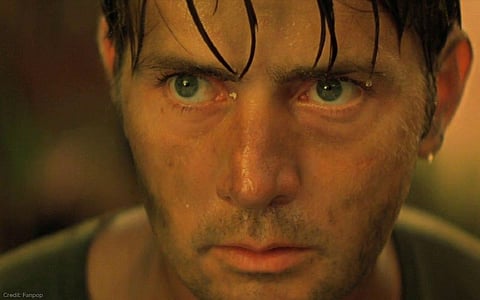
- Reviews
- Power List 2024
- Cannes 2024
- In-Depth Stories
- Web Stories
- News
- FC Lists
- Interviews
- Features
- FC SpecialsFC Specials

On the 40th anniversary of APOCALYPSE NOW, director Francis Ford Coppola unveiled a version of the film he called "The Final Cut". Speaking through a video recording before the screening, he said he was unhappy with the original (1979) release and tried to fix things with the "Redux" version (2001). And this latest cut, he said, was the definitive one. I don't know. I think the first version is a masterwork and the 2001 re-edit was more of a "why fix what ain't broke?" curiosity, especially with that endless interlude at the French plantation, with a ton of philosophising about war. The visceral strength of the 1979 film (which did not have that French plantation interlude) is that there is no philosophy, no argument, no rationalisation. It's just a gradual descent into madness, and when Marlon Brando appears, even his "philosophy" sounds appropriately bonkers. "The Final Cut" trims the French plantation stretch, but it still feels redundant. The thrill for me, then, was simply to watch — for the first time on the big screen — one of the most staggering achievements of the cinema.
***
How many movies can you think of that depict women during or after wartime? Not the action heroines of Zero Dark Thirty or the Aliens installments (which are certainly some kind of war movies). Not women leading from the front, but those working on the sidelines or simply left waiting. We have Greer Garson in Mrs. Miniver (1942). We have Anna Magnani and Maria Michi in Rome, Open City. We have the women of The Marriage of Maria Braun (1979), Sophie's Choice (1982), The English Patient (1996). To this small list, we can now add Kantemir Balagov's Beanpole, which opens on Iya's (Viktoria Mironshnichenko) face. Her name is Greek for violet, but she looks very little like a delicate flower. She's tall. Really tall. That's how the film gets its name. The camera pulls back, and we see that she's standing — but strangely immobile. She seems to be undergoing some sort of spasm, one that manifests itself only through clicking sounds from her teeth. This is some kind of PTSD. It's Leningrad. The first autumn after the War.
The other woman in this story is Iya's friend Masha (Vasilisa Perelygina), who comes home from the war and finds that greater sorrows await her. Through Iya and Masha, Beanpole explores what war does to people. I realise that this description sounds very banal, so I'll give you a sample scene, where Masha meets the parents of the very rich man who wants to marry her. She reveals, frankly, that she was an army wife, someone who kept officers company while they were away from their families. "For years, that part of my body got me bread and potatoes." The boy's mother is actually sympathetic. She asks Masha not to marry her son — not because she is "soiled" but because she doesn't trust that her son sees Masha any differently from how those officers did.
This exquisitely directed drama is very deliberately paced (we chart every heartbeat), and the warm colours are a rich contrast to the soot-streaked cinematography we usually get in war movies. "This conflict between bright colours and the nature of post-war life is also very interesting to me," the director said in an interview. Take the deep green of Masha's new dress. She is so happy that she wants to twirl and see how the skirt spins and settles around her. She twirls. And twirls. Gradually, the motion becomes more manic. We see her unraveling like a ball of yarn. Masha is outward, Iya is indrawn — so Masha becomes the film's standout. On screen, active people are usually more interesting than passive ones — but then, both women embody the two extremes of response to a great tragedy. We don't need visuals of bombed-out buildings to see what happened. We just need to study these faces.
***
Corneliu Porumboiu's The Whistlers is the kind of film you don't expect from a Romanian filmmaker: a sexy, twisty comedy-noir that involves a language made entirely of whistles. (Such a language actually exists, and it's a useful code to convey information beyond the ears of the police, who'll probably mistake it for chirping birds.) The protagonist is a corrupt cop (Cristi, played by Vlad Ivanov) who works for the Mafia. We have a femme fatale (Catrinel Marlon, named Gilda, perhaps after Rita Hayworth's most famous film, where she played a femme fatale). And there's also — inevitably — a heist gone wrong and money stuffed into mattresses. While the Mafia are turning the screws on Cristi, his boss (Rodica Lazar) suspects him, too. The result is a weirdly enjoyable cross-genre romp, that ends in, of all places, Singapore. Though, to be honest, seeing a Romanian film make use of a gaudy sound-and-light show in the Garden City feels like its own kind of genre crossing.